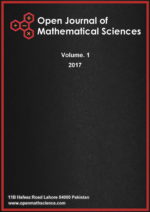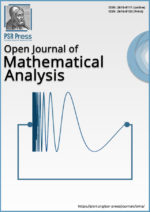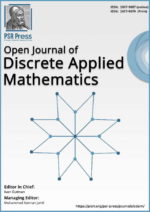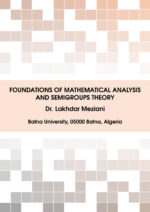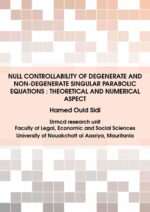Ptolemy Scientific Research Press (PSR Press)is a highly regarded publisher of scientific literature dedicated to bringing the latest research and findings to a broader audience. With a focus on cutting-edge research and technology, Ptolemy Scientific Research Press offers a range of publications catering to professionals, researchers, and student’s needs. Whether looking for information on the latest breakthroughs in physics, biology, engineering, or computer science, you can trust Ptolemy Scientific Research Press to deliver insightful, accurate, and engaging content. With its commitment to quality, accessibility, and innovation, Ptolemy Scientific Research Press is an essential resource for anyone interested in science and technology.

Latest Published Articles
OMA-Vol. 5 (2021), Issue 1, pp. 1 – 8 Open Access Full-Text PDF
Mohamed Mellah
Abstract: The double dispersive wave equation with memory and source terms \(u_{tt}-\Delta u-\Delta u_{tt}+\Delta^{2}u-\int_{0}^{t}g(t-\tau)\Delta^{2}u(\tau)d\tau-\Delta u_{t}=|u|^{p-2}u\) is considered in bounded domain. The existence of global solutions and decay rates of the energy are proved.
OMS-Vol. 5 (2021), Issue 1, pp. 18 – 26 Open Access Full-Text PDF
S. E. Fadugba
Abstract: This paper presents the development of a new numerical scheme for the solution of exponential growth and decay models emanated from biological sciences. The scheme has been derived via the combination of two interpolants namely, polynomial and exponential functions. The analysis of the local truncation error of the derived scheme is investigated by means of the Taylor’s series expansion. In order to test the performance of the scheme in terms of accuracy in the context of the exact solution, four biological models were solved numerically. The absolute error has been computed successfully at each mesh point of the integration interval under consideration. The numerical results generated via the scheme agree with the exact solution and with the fifth order convergence based upon the analysis carried out. Hence, the scheme is found to be of order five, accurate and is a good approach to be included in the class of linear explicit numerical methods for the solution of initial value problems in ordinary differential equations.
OMS-Vol. 5 (2021), Issue 1, pp. 11 – 17 Open Access Full-Text PDF
Francisco Caruso, Felipe Silveira
Abstract: A new series representation of the modified Bessel function of the second kind \(K_0(x)\) in terms of simple elementary functions (Kummer’s function) is obtained. The accuracy of different orders in this expansion is analysed and has been shown not to be so good as those of different approximations found in the literature. In the sequel, new polynomial approximations for \(K_0(x)\), in the limits \(0 < x \leq 2\) and \(2\leq x < \infty\), are obtained. They are shown to be much more accurate than the two best classical approximations given by the Abramowitz and Stegun's Handbook, for those intervals.
OMS-Vol. 5 (2021), Issue 1, pp. 1 – 10 Open Access Full-Text PDF
Ghulam Farid, Atiq Ur Rehman, Sidra Bibi, Yu-Ming Chu
Abstract: The aim of this paper is to study the fractional Hadamard inequalities for Caputo fractional derivatives of strongly convex functions. We obtain refinements of two known fractional versions of the Hadamard inequality for convex functions. By applying identities for Caputo fractional derivatives we get refinements of error bounds of these inequalities. The given results simultaneously provide refinements as well as generalizations of already known inequalities.
ODAM-Vol. 4 (2021), Issue 1, pp. 1 – 3 Open Access Full-Text PDF
Ivan Gutman
Abstract: The recently introduced class of vertex-degree-based molecular structure descriptors, called Sombor indices (\(SO\)), are examined and a few of their basic properties established. Simple lower and upper bounds for \(SO\) are determined. It is shown that any vertex–degree–based descriptor can be viewed as a special case of a Sombor-type index.
OMS-Vol. 4 (2020), Issue 1, pp. 476 – 484 Open Access Full-Text PDF
AbdulAzeez Kayode Jimoh, Aolat Olabisi Oyedeji
Abstract: This paper considers the extension of the Adomian decomposition method (ADM) for solving nonlinear ordinary differential equations of constant coefficients to those equations with variable coefficients. The total derivatives of the nonlinear functions involved in the problem considered were derived in order to obtain the Adomian polynomials for the problems. Numerical experiments show that Adomian decomposition method can be extended as alternative way for finding numerical solutions to ordinary differential equations of variable coefficients. Furthermore, the method is easy with no assumption and it produces accurate results when compared with other methods in literature.

